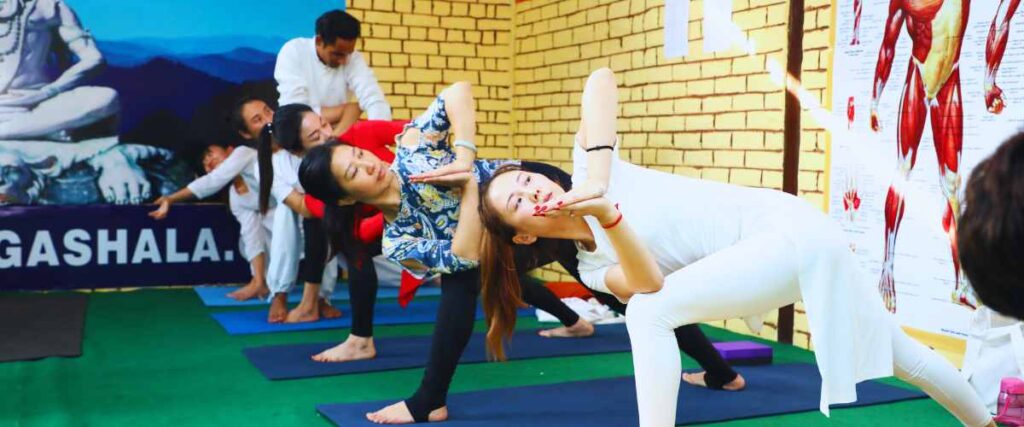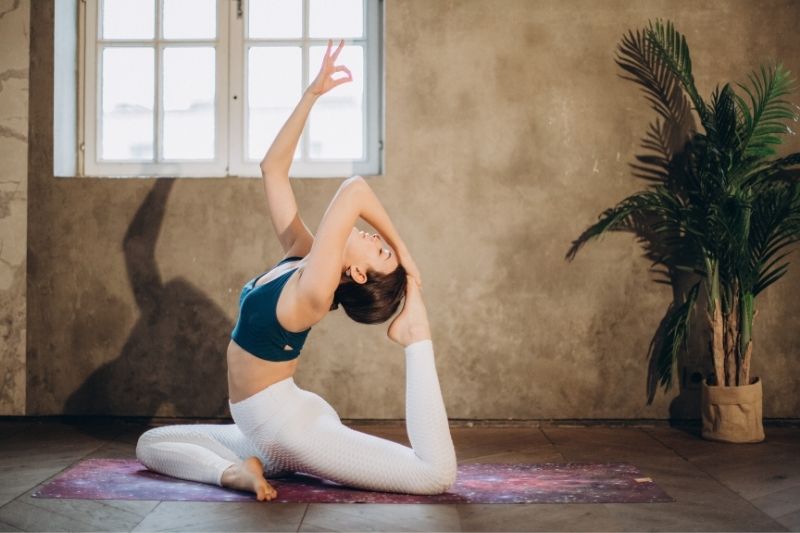Yoga is an ancient form of physical activity that has captured the attention of people all over the globe due to its holistic benefits. The beautiful thing about yoga is that it can be practiced for personal health improvement or as a calling to go to the next level and become a certified instructor. India is often referred to as the Yoga Capital of the World, and one of the major reasons for that is Rishikesh, where people from all over the world go for teacher training.
With the majestic Himalayas standing guard along the holy Ganges river in Rishikesh, the region has a unique ability to augment the experiences that one can have through yoga. But even then, a question arises — when is the right time to start 200 hours of yoga teacher training in Rishikesh? The answer can be deeply personal as it varies from person to person. Let’s explore these parameters in detail.
Understanding the 200-Hour Yoga Teacher Training (YTT) Program
Before explaining when is a good time to start the training, let’s explore the structure of a 200-hour YTT program. It has an intensive two week course which is a prerequisite for anyone looking to get certified as a yoga teacher. The core curriculum includes –
- Asana (Physical Postures): Instruction on important movements and the proper engagement of major muscle systems and bones related to human motion beyond the yoga poses.
- Pranayama (Breathing Techniques): Advanced energetic strategies for breathing focusing on increasing vigor and imagination.
- Anatomy and Physiology: The body mechanics and the impact of yoga on various bodily systems.
- Yoga Philosophy: The study of primary ancient texts like The Bhagavad Gita, The Yoga Sutras of Patanjali, and The Upanishads.
- Teaching Methodology: Practical teaching techniques that include instruction, student pose modification, and assisting.
With completion comes certification, which is gained through Yoga Alliance, letting you teach yoga anywhere in the world.
Check Out Yoga Teacher Training in India
The Right Time for You to Start Is Now
Twelve days to complete a fully immersive 200 hour YTT program is not the same for everyone. These sessions can help to decipher numerous important factors one should consider before onboarding. Let’s take a look.
- Personal Readiness
Do you have what it takes to start? To reiterate, the physical component on this specific answer is not the sole factor. Mental and emotional readiness is also crucial when it comes to training. Yogic Teacher Training is a brutal endeavor that comes with its own set of emotional challenges. Not only will you need to train your body, skills, and faculties, you will need to face daunting changes. Change in attitude, self-discovery, limit-testing, and an overhaul belief system to name a few.
In case you have been practicing asanas for a couple of months and sense an inclination towards a more profound engagement, this might indicate that you are ready to take the plunge. That said, every practitioner should feel some degree of stability in their practice, or else it could become quite challenging to teach it. YTT is much more than learning to teach classes: it is a process of self-change.
- Physical Health and Fitness
Benefits of yoga can be enjoyed by all, however for 200 hour YTT, one must possess some level of fitness. In Rishikesh, for instance, you will most likely be expected to do several hours of asanas and also perform pranayama and meditation. If you have some experience with yoga and are familiar with different postures and breathing, you will be better prepared physically for this demanding journey.
To tell you the truth, the calm atmosphere of Rishikesh paired with its generous yoga enthusiasts is enough to help anyone who is willing to subject themselves to the physical rigor of yoga. While you don’t have to be a professional, a solid practice will help you out greatly.
- Emotional and Mental Readiness
Yoga Trainer Development is a course that many people perceive to be sensitive, emotional, and a journey involving self-reflection. Almost every individual who has undergone this course mentions that they experienced an intimate self-change. Noticing emotions? That is fine, but more importantly, it is imperative to ask oneself, am I prepared? Self-inflection is tough, solitude from habitude is mandatory.
When the emotions, recollections, or insights within arise, stir things up, brings in waves, and pulses to keep shaking you, this guiding compass that nudges inward, resonating, is divine. Energetic detours will sometimes require uncoiling hurts deeply held, or perhaps learn novel frameworks to embracing tension within the college of life. Just keep in mind, self-exploration and internal querying can be hard prior to applying.
- Financial and Logistical Considerations
Taking part in Yoga Teacher’s Training involves a significant chunck of dedication and finances alike. If You find yourself financially healthy enough to afford the program along with work commitments, it may just the right time for you now. Spending and investing both require care while in your active life, planning goes a long way. A 200-hour YTT in Rishikesh often includes the training, meals and accommodation.
Besides being financially prepared, consider your other commitments. Do you have work, family, or personal obligations that you tend to? Some individuals have a hard time loosening the grip their everyday happenings have on them, and this impacts the quality of their training experience. Strive to make certain you can train without external distractions or feeling overloaded.
- Desire to Teach or Deepen Your Practice?
Check your thoughts for the motivation that drives you to opt for this training before going with it. Are you looking forward to becoming a teacher to disseminate the word of yoga? Or do you wish to deepen your practice for personal motivations? Either reasoning is acceptable, but being clear about your motivations will assist you find the timely fit of program.
For those who are excited about teaching, if fitness instruction is on your agenda, there is no better time to start than now. But in the event you are on the fence or prefer practicing yoga in solitude without the communal aspect, waiting longer until you feel a stronger inclination to teach may be advisable.
- Spiritual Readiness
The practice of yoga goes beyond the physical practice and involves the spirit as well. It does not matter which religion you follow. Yoga may aid you in achieving self-realization on a spiritual level. In Rishikesh, you will be surrounded by a spiritual environment that will often test your beliefs and assumptions. To those who are spiritually curious and wish to refine yoga’s more philosophical dimensions and feel prepared, then perhaps this is the ideal time to start your teacher training.
The temples and ashrams, along with natural beauty, make Rishikesh unique and enhances the spirituality of the place. For those intellectuals who have fantasized about learning yoga in the birthplace of the art, then it seems Rishikesh is waiting for you.
Conclusion: When Is the Right Time to Start a 200 Hour Yoga Teacher Training in Rishikesh?
The appropriate time to start a 200 hour yoga teacher training course in Rishikesh is different for everyone. It is during this time when one should reflect upon themselves, their emotional state, mental maturity along with physical fitness. If there is a strong urge to deepen your practice, self-transform, and share your passion for yoga with people, then nap time is over, and it is time to act.
Ultimately, commencing your journey with us will make most sense if you are physically and mentally prepared, financially sound, and emotionally committed. Embracing the path of a yoga teacher is a decision that will shape your life profoundly, especially when taken in the land of yoga’s origin.
Join our Yoga Teacher Training Course in Rishikesh
Frequently Asked Questions:
1. What is the minimum yoga experience required for a 200-hour yoga teacher training in Rishikesh?
You need to have practiced for at least 6 months to be able to attend a 200 hour YTT because there is some prior knowledge that will be useful like basic poses and breathing exercises.
2. Can beginners join a 200-hour YTT in Rishikesh?
Of course! Some prior experience is great to have, but the program is designed for beginners. All participants will be well taken care of by fully qualified and seasoned teachers throughout the course.
3. How much does a 200-hour YTT in Rishikesh cost?
Prices tend to fluctuate, but you can expect to pay somewhere around $1,500 to $3,000 on average. This price often covers accommodation, meals, and course materials, which is quite comprehensive.
4. Do I need to be physically fit for a 200-hour YTT?
You don’t have to be a competitive athlete, but being fit helps. Having to practice yoga for several hours a day does require a certain amount of stamina.
5. How long does the training take?
Usually a 200-hour YTT in Rishikesh, would take around 3 to 4 weeks, though some programs may offer additional flexibility.
6. Will I be able to teach yoga after the completion of the 200-hour training?
Absolutely, you will be granted a certification from Yoga Alliance which will give you the global right to practice yoga teaching.



